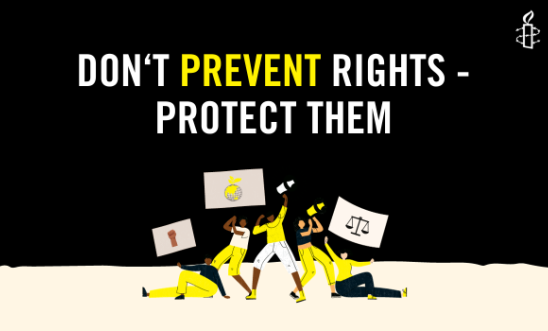
Press releases
UK: Latest figures show Government continues to 'sweep up innocent people' into the dragnet of Prevent

New Home Office annual Prevent statistics show thousands continue to be referred to the flawed counter-terrorism programme
Over 2100 referrals were for children under the age of 14 including 256 individuals under the age of 10
‘The problems with Prevent run so deep that the Government must abolish Prevent’ – Ilyas Nagdee
Amnesty International has denounced the Government’s flawed Prevent duty that continues to “sweep up innocent people”, disproportionately children, into the counter-terrorism programme as revealed in the Home Office’s annual Prevent statistics published today (7 Dec).
The latest Home Office figures show that between April 2022 and March 2023, 6817 people were referred to Prevent. The education sector made the greatest number of referrals (2684), followed by the police (1943). Of those referred, 645 were recommended for Channel intervention. This represents fewer than 1 in 10 and widens the gap from previous years of people being referred to being adopted as Channel cases. By Prevent’s own metrics, this would be considered a failure.
The high number of referrals comes just days after the Head of counter-terrorism at Scotland Yard stated that the conflict in Israel and Gaza had prompted a “large jump” in referrals. Amnesty has serious concerns that Government attempts to crackdown on freedom of expression in the wake of the current crisis in Gaza, Israel and the wider Occupied Palestinian Territories, including encouraging schools to make Prevent referrals in reference to the current crisis, will contribute to more and more innocent people being dragged into the Prevent system.
Last month, it was reported that a student in Yorkshire was visited in her home by police in what she describes as a scene from ‘Minority Report’ following her posting a tweet expressing solidarity with Palestine.
In November, Amnesty released a report – The Prevent duty and its chilling effect on human rights – highlighting a series of fundamental flaws in the system, including discriminatory decision-making that operates on a “gut feeling” basis and a deeply concerning lack of transparency where people often do not know why they’ve been referred or what information is being held on them. Amnesty concluded that the duty is having a chilling effect on open debate, free speech and political dissent.
Amnesty found that Prevent is fundamentally incompatible with the UK’s international human rights obligations, disproportionately violates the human rights of young minoritised people, targets innocent children and operates with insufficient transparency or oversight.
Ilyas Nagdee, Amnesty International UK’s Racial Justice Director, said:
“The latest figures show that the dragnet approach of Prevent continues to sweep up thousands of innocent people.
“Behind each statistic are impacted young people and their families whose lives are turned upside down following referrals. These families spend years and sometimes thousands of pounds in an attempt to learn what has happened to their referral.
“We found Prevent was being used to police non-violent political expression including on topics such as Palestine. It’s clear this is having a chilling effect on open debate, free speech and political dissent.
“We re-iterate our calls – the problems with Prevent run so deep that the Government must abolish the programme.”
Abolish Prevent
Based on the evidence presented in the report, Amnesty concludes that the Prevent strategy does not comply with international human rights law and should be abolished.
In its recent Prevent report Amnesty called for greater investment in child protection and education, teachers and other professionals should use educational and social work methods and safeguarding processes to engage with children whose behaviour would otherwise lead them to make a Prevent referral. A teacher or social worker-led response, which prioritises the welfare and development of the child and in which the child’s best interests are a primary consideration, is preferable to the current system, which prioritises national security and involves counter-terrorism police in the lives of children who are not accused of any crime.
The Government should also refrain from associating non-violent groups and their views (“non-violent extremism”) with terrorism. Amnesty has also raised concerns about attempts to delegitimise criticisms of the Prevent strategy by journalists, academics and civil society, and advised that the Government should instead engage meaningfully with the issues raised.
The Government must establish and implement alternatives to the criminal justice system for children accused of terrorism offences and ensure victims of human rights violations under the Prevent strategy have access to an effective remedy, including access to justice, compensation, rehabilitation, satisfaction and guarantees of non-repetition.